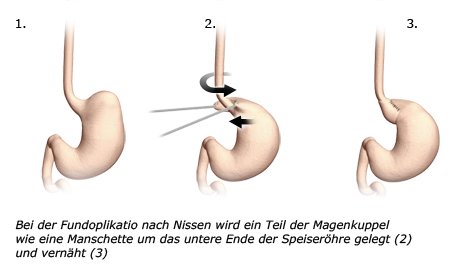Albarqouni L, Moynihan R, Clark J et al. Head of bed elevation to relieve gastroesophageal reflux symptoms: a systematic review. BMC Fam Pract 2021; 22(1): 24.
Barthelsson C, Lützén K, Anderberg B et al. Patients' experiences of laparoscopic fundoplication in day surgery. Ambul Surg 2003; 10(2): 101-107.
Boghossian TA, Rashid FJ, Thompson W et al. Deprescribing versus continuation of chronic proton pump inhibitor use in adults. Cochrane Database Syst Rev 2017; (3): CD011969.
Bundesinstitut für Arzneimittel und Medizinprodukte (BfArM). Protonenpumpeninhibitoren (verschreibungspflichtige Formen): Risiko von Knochenbrüchen sowie von Hypomagnesiämie, Aufforderung zur Textanpassung. 2012.
Dent J, Jones R, Kahrilas P, Talley NJ. Management of gastro-oesophageal reflux disease in general practice. BMJ 2001; 322(7282): 344-347.
Deutsche Gesellschaft für Gastroenterologie, Verdauungs- und Stoffwechselkrankheiten (DGVS). Gastroösophageale Refluxkrankheit und eosinophile Ösophagitis (S2k-Leitinie). AWMF-Registernr.: 021-013. Z Gastroenterol 2023; 61(7): 862-933.
Dibley LB, Norton C, Jones R. Don't eat tomatoes: patient's self-reported experiences of causes of symptoms in gastro-oesophageal reflux disease. Fam Pract 2010; 27(4): 410-417.
Eom CS, Park SM, Myung SK et al. Use of acid-suppressive drugs and risk of fracture: a meta-analysis of observational studies. Ann Fam Med 2011; 9(3): 257-267.
Garg SK, Gurusamy KS. Laparoscopic fundoplication surgery versus medical management for gastro-oesophageal reflux disease (GORD) in adults. Cochrane Database Syst Rev 2015; (11): CD003243.
Ip S, Chung M, Moorth D et al. Comparative effectiveness of management strategies for gastroesophageal reflux disease: update. (AHRQ Comparative Effectiveness Reviews; No. 29). 2011.
Johnstone J, Nerenberg K, Loeb M. Meta-analysis: proton pump inhibitor use and the risk of community-acquired pneumonia. Aliment Pharmacol Ther 2010; 31(11): 1165-1177.
Jones R, Hunt C, Stevens R et al. Management of common gastrointestinal disorders: quality criteria based on patients' views and practice guidelines. Br J Gen Pract 2009; 59(563): e199-208.
Kahrilas PJ, Howden CW, Hughes N. Response of regurgitation to proton pump inhibitor therapy in clinical trials of gastroesophageal reflux disease. Am J Gastroenterol 2011; 106(8): 1419-1425; quiz 1426.
Kwok CS, Yeong JK, Loke YK. Meta-analysis: risk of fractures with acid-suppressing medication. Bone 2011; 48(4): 768-776.
Leiman DA, Riff BP, Morgan S et al. Alginate therapy is effective treatment for GERD symptoms: a systematic review and meta-analysis. Dis Esophagus 2017; 30(5): 1-9.
Li G, Jiang N, Chendaer N et al. Laparoscopic Nissen Versus Toupet Fundoplication for Short- and Long-Term Treatment of Gastroesophageal Reflux Disease: A Meta-Analysis and Systematic Review. Surg Innov 2023; 30(6): 745-757.
Rickenbacher N, Kötter T, Kochen MM et al. Fundoplication versus medical management of gastroesophageal reflux disease: systematic review and meta-analysis. Surg Endosc 2014; 28(1): 143-155.
Sigterman KE, van Pinxteren B, Bonis PA et al. Short-term treatment with proton pump inhibitors, H2-receptor antagonists and prokinetics for gastro-oesophageal reflux disease-like symptoms and endoscopy negative reflux disease. Cochrane Database Syst Rev 2013; (5): CD002095.
Song H, Zhu J, Lu D. Long-term proton pump inhibitor (PPI) use and the development of gastric pre-malignant lesions. Cochrane Database Syst Rev 2014; (12): CD010623.
Sun S, Cui Z, Zhou M et al. Proton pump inhibitor monotherapy and the risk of cardiovascular events in patients with gastro-esophageal reflux disease: a meta-analysis. Neurogastroenterol Motil 2017; 29(2).
Wang Y, Pan T, Wang Q, Guo Z. Additional bedtime H2-receptor antagonist for the control of nocturnal gastric acid breakthrough. Cochrane Database Syst Rev 2009; (4): CD004275.
IQWiG-Gesundheitsinformationen sollen helfen, Vor- und Nachteile wichtiger Behandlungsmöglichkeiten und Angebote der Gesundheitsversorgung zu verstehen.
Ob eine der von uns beschriebenen Möglichkeiten im Einzelfall tatsächlich sinnvoll ist, kann im Gespräch mit einer Ärztin oder einem Arzt geklärt werden. Gesundheitsinformation.de kann das Gespräch mit Fachleuten unterstützen, aber nicht ersetzen. Wir bieten keine individuelle Beratung.
Unsere Informationen beruhen auf den Ergebnissen hochwertiger Studien. Sie sind von einem Team aus Medizin, Wissenschaft und Redaktion erstellt und von Expertinnen und Experten außerhalb des IQWiG begutachtet. Wie wir unsere Texte erarbeiten und aktuell halten, beschreiben wir ausführlich in unseren Methoden.


